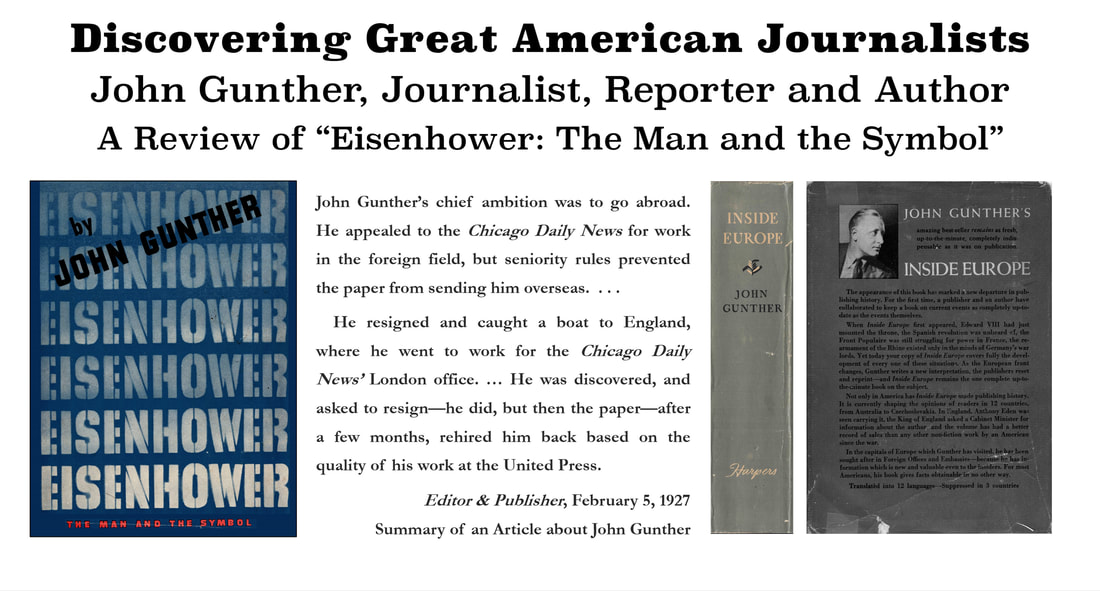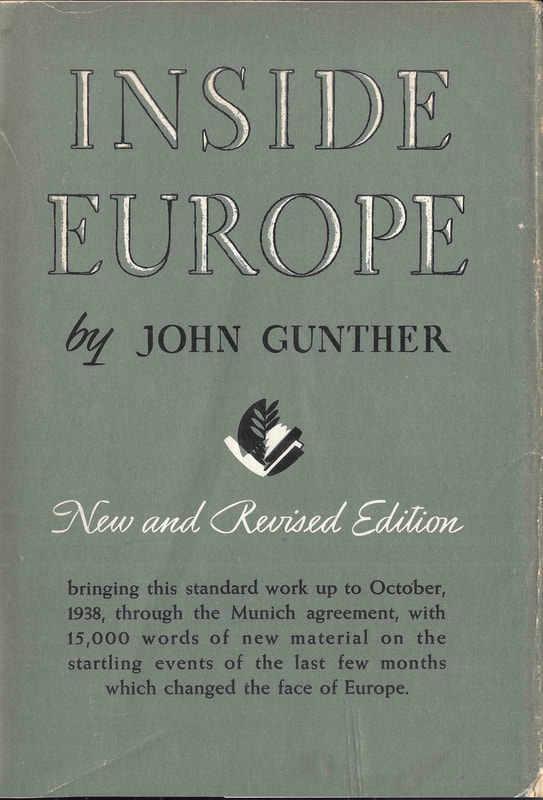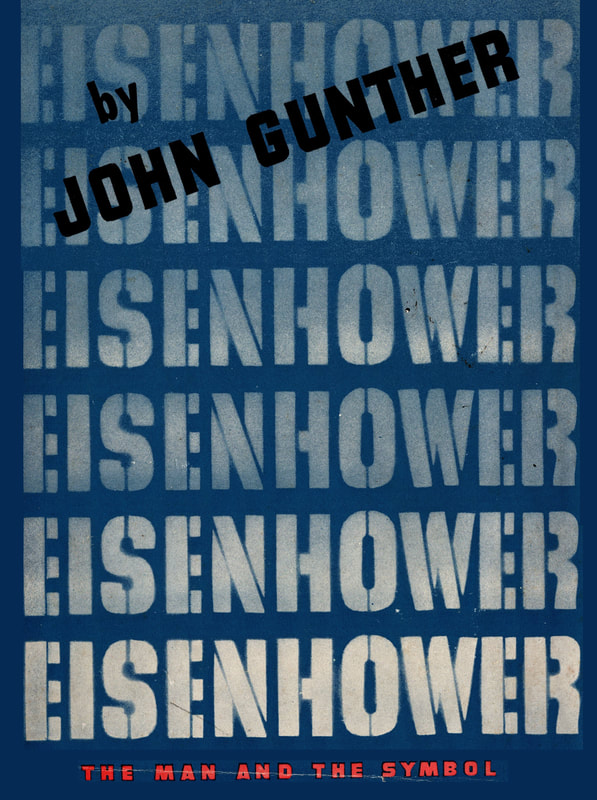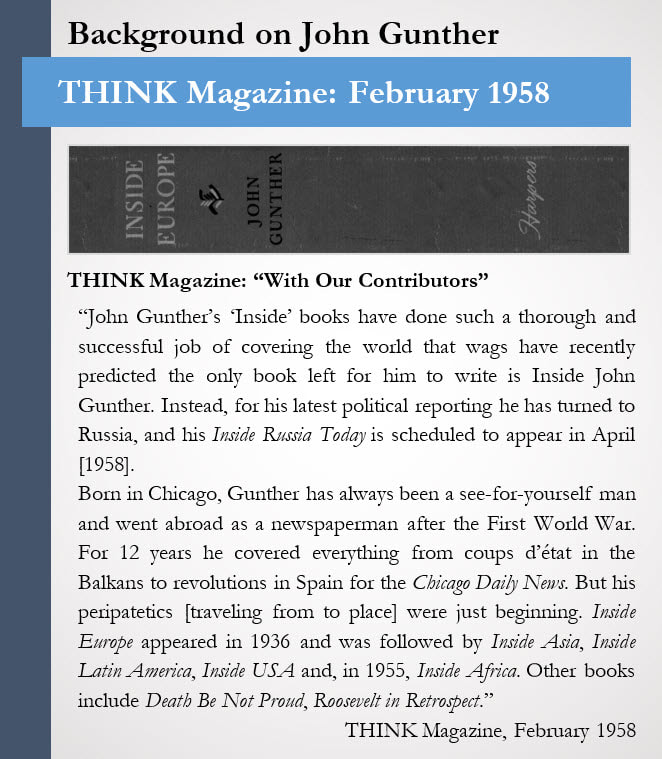John Gunther's "Eisenhower: The Man and the Symbol"
|
|
Date Published: June 30, 2022
Date Modified: February 22, 2024 |
“Gunther’s Eisenhower: The Man and the Symbol is a highly readable first-rate reporter’s appraisal of Eisenhower’s character—assets and liabilities. … [The reader] may not agree with the sum the author has totaled up but any reader must agree that Gunther has done a remarkably fair and intelligent job. …
There will be other books about General Eisenhower but of those written to date this one gets across the personality of the man better than any I have read.”
There will be other books about General Eisenhower but of those written to date this one gets across the personality of the man better than any I have read.”
G. N. Battle, Books for the Family
The Franklin Indiana Evening Star, March 1952
The Franklin Indiana Evening Star, March 1952
A Review of Eisenhower: The Man and the Symbol by John Gunther
- Reviews of the Day: 1952
- Interesting Insights from Eisenhower: The Man and the Symbol
- This Author’s Perceptions of Eisenhower: The Man and the Symbol
Reviews of the Day: 1952
There were an amazing number of reviews. I attribute this press attention to Eisenhower’s popularity, John Gunther’s well-deserved, worldwide reputation as the author of an “Inside of …” series of books, [See Footnote #1 and the next image: Inside Europe] and anticipation of the next presidential contest in 1952—which Eisenhower, after bowing out of the 1948 contest, would run in and win.
|
“Seldom has John Gunther’s facile talent shown to a better advantage than in this personality portrait of General Dwight Eisenhower. … Gunther explains Eisenhower’s ‘torrential popularity’ by noting that ‘to be liked, one has to like,’ and Ike himself ‘likes so many people.’ …
‘Talking these days,’ reports Gunther, Eisenhower ‘can scarcely keep off the subject of spiritual renaissance.’ That may seem attractive to American voters.” Robert W. Smith, “Ike’s Knack,” The Minneapolis Sunday Tribute, February 1952
“Here is a strictly up-to-the-minute report on one of the most important—perhaps the most vital and compelling—figures of our time. … With the accuracy, honesty and vividness for which he is famous, John Gunther presents the man, his career, and his future prospects. …
This book is largely the picture of an honest idealist, a simple man with genius for personal relations, a man who could symbolize unity and common sense.” |
One of John Gunther's "Inside" series.
|
R. H. Bond, “Gunther … on General Eisenhower,” The Jackson Sun, February 1952
“Strictly a quickie, this is not a great biography. But it is a good, intelligent report, the kind Americans will read, understand and enjoy. … Gunther paints an extremely attractive picture of Ike. It is a picture, first of all, of a man so human, so American, that it is just this side of unbelievable.
And the human, American qualities that have endeared Dwight Eisenhower to so many millions are genuine, Gunther writes. He doesn’t turn on the charm—it is always on. He doesn’t have to try to be friendly, modest, poised or great. And, in a sense, that is why he [Eisenhower] is, to some extent, all of these.”
And the human, American qualities that have endeared Dwight Eisenhower to so many millions are genuine, Gunther writes. He doesn’t turn on the charm—it is always on. He doesn’t have to try to be friendly, modest, poised or great. And, in a sense, that is why he [Eisenhower] is, to some extent, all of these.”
John Ed Pearce, “Gunther’s New Book,” The Louisville Courier-Journal, February 1952
Interesting Insights from Eisenhower: The Man and the Symbol
John Gunther offered some amazing insights into the man: Dwight D. Eisenhower like the following:
“His speeches are to a remarkable extent packed with antiwar sentiment. Perhaps his apothegms in this direction are not as well-known as they should be.
“Here are a few:
“His speeches are to a remarkable extent packed with antiwar sentiment. Perhaps his apothegms in this direction are not as well-known as they should be.
“Here are a few:
But Gunther balances these perspectives of Eisenhower with this:
“On the other hand, he is not such a simpleton as to think that there is no obverse side to the picture: |
Eisenhower by John Gunther
|
- ‘In our hatred of war—in our repudiation of rule by force which means enslavement—we still cannot forget those ennobling traits of human character which alone can carry men forward to victory, when war is thrust upon us. …
‘Weakness cannot cooperate with anything.
‘We have got to be strong.’ ”
This Author’s Perceptions of Eisenhower: The Man and the Symbol
|
I read this book in one sitting. There was no way to put it down after starting. It was a quick, simple but enthralling read. It is absolutely not a biography—Gunther says as much at the outset. "Personality portrait" as used in one of the reviews above is the perfect description.
Personally, I find the start of so many biographies just downright boring, almost like spending time on the early “dullness” is part of the biographer’s duty. But of all the chapters, the first chapter “Eisenhower: The Man” sets the tone for the whole book. The chapter describes and projects the characteristics of a great leader who carried the United States and Europe to victory during World War II and then helped meld together a coalition to hold the line against Communist Russia. Here are a few examples from the first chapter:
|
- “Eisenhower is extremely deft at handling a group, almost any kind of group. His talent for conciliation, for welding a team, is one of his salient characteristics.”
- “He sees other points of view. He is commendably quick to modify his own.”
- “There is nothing static or cramped about Eisenhower. His attitude is always supple and aware.”
- “He is open-minded and likes to take advice.”
- “People in lower echelons say, ‘If we can only get this issue to Ike, it will be all right.’ ”
- “Another quality is his directness, his capacity for quick action.”
- “He deliberately chose aides because he knew that they would not be mere yes men and would not be subservient.”
- “The balance, however, is all on the side of his modesty.”
- “He will accept nobody who does not have active faith in the job being done. Competence alone is not enough. There must be idealism too.”
Then again, I was eighteen and just trying to do my job as best I could.
I appreciated the very last sentence in the book:
“I kept thinking that this man [Eisenhower] might be a four-star general and all that, but what I would always remember about him was that he was such a splendid human being.”
Don't we need leaders like this again?
John Gunther conveys this information about a splendid man—one of our former Presidents, in a balanced, well-written manner. A highly commendable and recommendable book.
Cheers,
- Pete
John Gunther conveys this information about a splendid man—one of our former Presidents, in a balanced, well-written manner. A highly commendable and recommendable book.
Cheers,
- Pete
[Footnote #1] The list of “Inside” books by John Gunther—many of which were updated numerous times with new revisions—is the following: Inside U.S.A., Inside Latin America, Inside Asia, and Inside Europe. One of the common puns of the day was that the title of this book should have been “Inside Eisenhower” as it was a look at the character and internal workings of a soon-to-be President of the United States.
[Footnote #2] The phrase “total war” is a phrase that came into the common vernacular in the United States after World War I and the publication of Herbert Hoover’s book, “The Problems of a Lasting Peace.” Historians should dig deeper into this phrase's meaning and usage by men such as Herbert Hoover, Dwight D. Eisenhower and Thomas J. Watson.
[Footnote #2] The phrase “total war” is a phrase that came into the common vernacular in the United States after World War I and the publication of Herbert Hoover’s book, “The Problems of a Lasting Peace.” Historians should dig deeper into this phrase's meaning and usage by men such as Herbert Hoover, Dwight D. Eisenhower and Thomas J. Watson.




